Who Is Peter Adam?
S.B. Chair of the Board Is a Contrarian
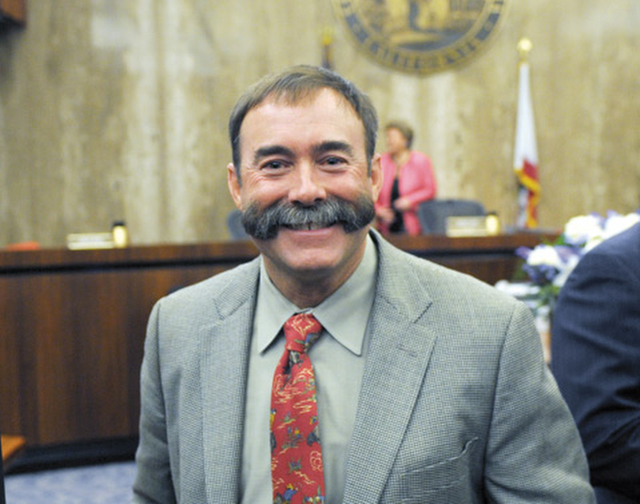
Fifteen years ago, anyone who suggested Santa Maria farmer Peter Adam would become chair of the Santa Barbara County Board of Supervisors would have been dismissed as a loon. Adam, a lifelong, self-proclaimed government loather, first burst into the public arena when he battled environmental planners over the right to work his family’s North County farm as he saw fit. He accused county government of conspiring against him, and sued to prove it.
Eventually he became an “anti-politician” politician, running in 2012 to represent the 4th Supervisorial District — made up of Lompoc, Guadalupe, portions of the Santa Maria Valley, and most of Orcutt. His candidacy was a long shot. Adam’s opponent was incumbent Joni Gray, a middle-of-the-road conservative backed by what remained of the Republican establishment. Adam painted her as ineffective and, worse, part of the red against blue political tennis match he greatly despised. She had succumbed to “the club.” He told voters, “If you’re looking for somebody who is going to bring home the bacon for the 4th District, do not vote for me.”
That November, he proved conventional wisdom wrong; he won. County operators were understandably anxious when Adam showed up on the fourth floor of the County Administration Building wearing Wrangler jeans and cowboy boots, ready to represent “the Colonies”— his description of North County taxpayers. But he was nervous, too.
Once Santa Barbara’s leading antigovernment protester, Adam has softened a bit as he has grown into the supervisor’s job. During the last three years, he’s had to meet all kinds of humanity and face all kinds of issues he never considered when living on the family farm. Though the five Santa Barbara supervisors are generally viewed as a dysfunctional family, Adam and his colleagues have gotten to know one another, especially in the less politically polarizing setting of closed sessions. Today even many of his adversaries admit to sincerely enjoying his personality. But Adam remains stubborn, often in opposition to the other members of the board, arguing points he cannot hope to win.
Fast-forward to January 5 of this year. Adam was sworn in as chair of the board. Though a rotating, largely ceremonial position, the chairperson sits at the center of the dais and carries the burden of ensuring meetings run smoothly. On his first day, Adam appeared awkward. This year — when he is up for reelection — will be telling for him: Will he find ways to collaborate with his colleagues so that the government can move forward, or as the chair, will his dogma increase tensions?
On his first day, Adam showed restraint. He even described his fellow supervisors as “mentors.” “If you don’t like what I’m doing, you might be looking in the mirror,” he laughed. Later, banging the gavel, he joked, “You’re going to be sorry you gave me this thing.”

Farmer Boy
One recent stormy Wednesday, I rode shotgun in Adam’s white pickup truck and toured his ranch, which he owns with his two younger brothers, Dominic and Kerry Adam. The trio formed Adam Brothers in 1994 and quadrupled the family’s property, which dates back five generations. It now comprises 1,800 acres of Sisquoc farmland and 1,600 acres of rangeland. They raise broccoli, cauliflower, celery, and cattle, employing 400 workers. To call it a “farm” does not do it justice.
I got a taste of a world North County farmers believe city-dwellers just don’t get. And they may be correct. I saw rolling countryside, sprawling fields, and a fundamentally different economy. Over lunch at a Mexican restaurant in Guadalupe, Peter Adam explained the operation: “We level the earth here. We irrigate. We extract water and spread it over thousands of acres to grow crops. We’ve been drilling holes up here since Jesus was a lieutenant.”
As a young person, Adam ran wild on his father’s Santa Maria ranch. He was a self-described “pain in the ass” who didn’t do great in school, because he was “probably bored.” He fought like “cats and dogs” with his father, Richard Adam, who died in 2014 at age 84. The senior Adam, who served on boards for the school district and water conservation district, was a “micromanager,” Adam said, whereas he is an “extreme delegator.”
At 9, Adam began riding seriously and developed a deep love for horses. Today, when people get sick of him, he said, “I just go ride my horses.” He and his wife, Amy Adam, have three kids, two who work at the ranch.
In person, Adam is jovial and boyish and laughs at his own jokes. He has soft hazel eyes and a gap between his two front teeth. But his signature feature is his mustache, a thick gray-brown stripe that spans across his entire face. It’s unlike any other on the planet.

Antigovernment Roots
Adam, now 52, was raised in a Roman Catholic family, the oldest of four boys. The first time he began to believe that government is an oppressive force came in the early 1990s when his father started a 10-year water-rights fight with the county. Some years later, when an attorney told him no one could sue the county because they were immune — they could do whatever they wanted — Adam’s antagonism toward government intensified.
In 1998, he began an open battle with the county after its environmental planners declared one-third of a 270-acre Adam Brothers parcel a protected wetland. This prohibited farming it. Adam believes that regulation stifles economic prosperity and that forbidding him to cultivate the 95 acres was an example of “ideological” extremism.
The Adam brothers began grading the lot without a permit in late 1998. Three months later, the county issued a stop-work order. A year later, after administrative appeals, he sued the county and its environmental planners. He later boasted he was “the most litigious son of a bitch” he knows. His suit charged that staff members Elihu Gevirtz and Dan Gira instructed biologist Katherine Rindlaub to simply draw an arbitrary red line on the map. “There was no science involved,” he said. Why would they make up such a thing? “They do not believe in private ownership of property,” he contended.
County planners insisted the designation emerged out of an exhaustive public process. Philip A. Seymour, who represented the planners, acknowledged mistakes were made, “but the idea that there was a conspiracy to falsify a report is ridiculous,” he said.
A Santa Maria jury found county environmental planners violated the company’s due process. It awarded Adam Brothers nearly $5 million for lost profits and $892,500 for the depreciated land value. The jury found the planners acted with “malice, oppression or fraud” and awarded Adam an additional $130,000 in punitive damages.
An appellate court later overturned the monetary damages; the company lacked standing to sue because it didn’t own the property before the designation. Adam also claims he personally faced a minimum three-year prison sentence for a federal Clean Water Act violation. The U.S. Army Corp of Engineers and the Environmental Protection Agency launched an investigation. Federal agents planned to come onto his property in what Adam described as a “shoot-to-kill” order. The then-sheriff Jim Thomas got involved and told the feds all they had to do to serve a search warrant was knock on his door. They did, and Adam cooperated. “It turned out to be a nonevent,” Thomas said.
He settled by paying $1 million.
In the end, Adam lost millions, but the wetland designation was reversed; he could farm the land. “I am still the winner because I did not have to give up the property and I never ended up in jail,” he said. But it left an abidingly bad taste in his mouth.
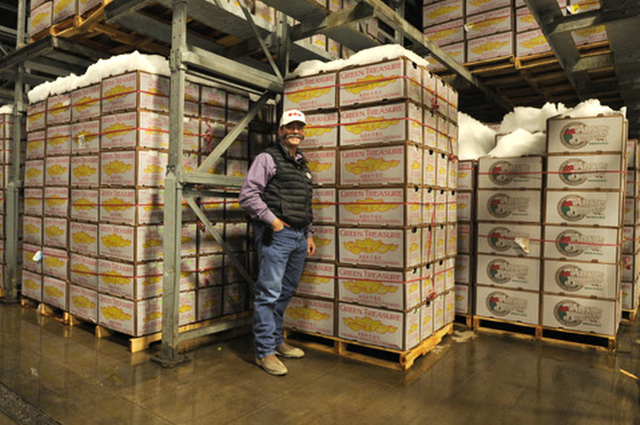
‘The Minority of a Minority’
After his first year in office, Adam boldly and, some said, presumptuously launched an initiative, known as Measure M. It proposed to funnel tens of millions of dollars into the repair and upkeep of county roads, parks, and public buildings. At first blush, it sounded great.
But the measure turned out to be deeply controversial. By committing limited county resources to road repair, opponents charged, Measure M would decimate funds for public safety, the courts, and human services. South Coast officials, including Sheriff Bill Brown and District Attorney Joyce Dudley, came out against it. Most telling was the outspoken opposition of the only other conservative on the board, 5th District Supervisor Steve Lavagnino. He led the charge against Measure M, even appearing in TV commercials with Adam’s chief adversary on the board, liberal-leaning 1st District Supervisor Salud Carbajal. Anti-Measure M forces raised $131,000 with sizable donations from the Chumash, the sheriff’s union, and the labor union SEIU. But Adam fought back, raising $113,000 from archconservative supporters. The measure came within 4 percentage points of winning.
During 2014 budget hearings held a week after Measure M’s defeat, the other supervisors acknowledged Adam had instigated an important conversation. They voted to set aside 18 percent of revenue growth each year for a decade. That equated to about $102 million in 10 years. But that wasn’t good enough for Adam. He voted against the county’s entire budget then, and each year since, because it did not provide enough for maintenance. Even longtime conservative and board agitator Andy Caldwell pushed Adam to compromise with his colleagues during that hearing, but he would not budge.
Respected economist and fiscal conservative Lanny Ebenstein, who opposed Measure M, said Adam’s methods showed his inexperience. “For people who haven’t been in government, they feel like the details don’t matter,” he said. Once you’ve been in the system awhile, you realize they do.

Take Half a Loaf
Another major battle, and one that highlighted his antagonism toward Carbajal, was over hoop houses, the tent-like structures that are used to cover field crops.
The issue came up last year when Windset Farms sought a building permit exemption for their hoop houses. It turned out that most of the estimated 4,500 acres of hoops covering county farmland exist illegally. In fact, Planning and Development Director Glenn Russell said no one had ever applied for a permit, let alone an exemption. On the books, structures shorter than 12 feet are already exempt, and the Agriculture Advisory Committee later recommended the height exemption be expanded to a maximum 20 feet.
Rather than pushing for a compromise hoop height amenable to North County ag interests, Adam argued they should not be restricted at all. He contended berry hoops are vital to save water, reduce pesticides, and create a better working environment. The South County supervisors disagreed. After a testy back-and-forth, Adam backed down, but just a little, pushing for a compromise of 36 feet.
In an op-ed, Adam later asked if Carbajal, who is running to represent the 24th Congressional District, would “… protect true agricultural viability or would … simply support “snow-globe” farms so he and his South Coast elite friends can drive by and enjoy the view?”
Carbajal responded that this issue was not about gamesmanship or putting forth extreme proposals to make a point. His opinion, he said, was based on conversations with agricultural representatives who said their hoop houses would not need to be higher than 18-20 feet. The planning staff will bring the item back before the board on February 9.

The Lone Wolf
While Adam’s hostility toward establishment liberal Carbajal is expected, his animosity toward Lavagnino is more surprising. He has attacked the 5th District supervisor in op-eds, condemning him and the other supervisors for voting to receive a 12 percent pay raise. He argued the board should evaluate themselves “more on the fiscal health of the county and whether or not we’re taking care of our infrastructure needs.” “I would give us a D,” he said. Lavagnino was furious. He called Adam a hypocrite and blasted him for getting “high fived” in the community for bashing the pay hike but taking the money.
When Adam was the only dissenter in the vote to give county employees paid time off during the week between Christmas and New Year’s Day, calling it a “gift of public funds,” Lavagnino dryly noted not much gets done during that time of the year anyway.
Joe Armendariz, conservative watchdog, former Carpinteria City Councilmember, and the county’s Taxpayers Association executive director, chalked up the difference between Adam and Lavagnino to different political styles. “[Peter]’s the consummate outsider,” he said. “Steve is the son of the very beloved mayor of Santa Maria who worked for the long-serving congressman [Elton Gallegly].”
“Would I like to have unanimous support from him? Yeah, I would,” Adam said of Lavagnino. “He’d probably like to have unanimous support from me, too.”
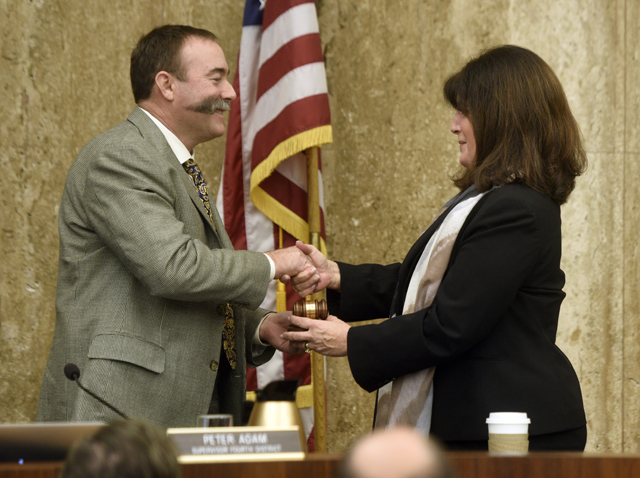
‘We Can’t Be Who We’re Not’
Though Adam is known for his far-right views, Caldwell said, “He’s no more extreme on the right than [Supervisor Janet Wolf] is to the other extreme.” Wolf more or less agreed. “He stands by his standards,” she said. “I guess I relate to that.”
Adam has repeatedly been the lone vote against renewing an emergency declaration after the Refugio Oil Spill, which allows the county to be eligible for state reimbursements. Adam objected because the county denied Exxon Mobil an emergency permit to truck crude oil on Highway 101 after its pipelines were forced to shut down. Wolf, meanwhile, has proved to be the board’s most outspoken critic of the oil industry.
Yet Adam and Wolf make an unlikely pair. It just so happens they share a birthday, May 17. Their personal relationship has grown from skeptical and at times prickly to affectionate. They are both stubborn and have a tendency to wear their hearts on their sleeves. “We can’t be who we’re not,” Wolf said.
Last November, Adam joined three other supes, Lavganino, Doreen Farr, and Carbajal, in voting to allow Sheriff Brown to explore alternatives to the reentry wing, better known as STAR, of his proposed northern branch jail project. The supervisors — Lavganino dissenting — had voted to kill the STAR project three weeks prior. But at the November meeting, Adam turned to Wolf and begged her to make the recommendation unanimous. She dissented, but the moment was noticeably sweet. It was also odd, as Adam never has qualms casting the nonconforming vote. (Adam has a public adversarial relationship with Brown; he campaigned for Brown’s challenger Sandra Brown in the 2014 Sheriff election.)
“There’s an authenticity in Peter I really like,” Wolf said. “We definitely disagree on policy.” But, she added, they are both fiscally conservative sometimes. “Personally,” Adam said of Wolf, “She’s my favorite. I just love her.”
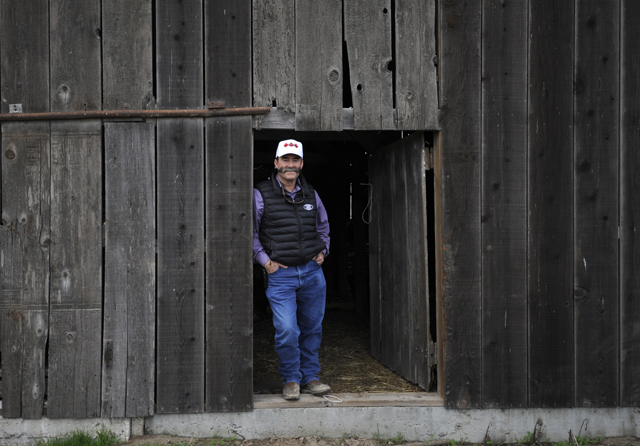
Tough Love
That’s no small compliment, considering Adam’s habit of besmirching his colleagues both in print and in session. Once he described the board as the “face of tyranny.” Another time he wrote that Carbajal, Wolf, and Farr “shared an elitist set of attitudes” and “seek to stifle economic development against the will of the governed.” He suggested people in North County should once again consider splitting from the south. He publically called on someone to run against liberal Assemblymember Das Williams for 1st District supervisor. During a contentious hearing, he called Sheriff Bill Brown “dude,” and later snapped at Lavagnino and Carbajal: “If we were at the ranch, I’d have a short phrase for you.” In an interview, he mocked environmentalists’ objection to development on the coast: “We can’t have a margarita blender that bothers a baby seal.”
“Peter says what’s on his mind,” Lompoc Mayor Bob Lingl said. “I don’t necessarily always think it’s the best thing to do.” He added, “I wish he’d be a little more accommodating to the other supervisors.”
Enviros
Adam does not pretend to be eco-friendly. When the board debates whether to approve two new houses in the coastal zone, Adam thinks they should be talking about 20. Where does he draw the line? He could not say for sure. “I know for a fact that at this point we haven’t gone anywhere near enough,” he said. He refutes manmade climate change “unless someone can explain to me how the Earth” historically warmed and cooled. “I can’t accept responsibility” for it this time, he said.
Mental-health care, however, is one issue to which Adam appears to be sympathetic. Long known for its dysfunction, ADMHS (Alcohol, Drug and Mental Health Services) brought on a new director, Alice Gleghorn, to initiate sweeping changes last year. Since then, Gleghorn faced intense scrutiny from other supervisors and community members, but Adam gave her unwavering support. “She’s in a very challenging position,” he said. “She’s dealing with a bunch of psychiatrists. These guys screw with people’s heads all the time.”
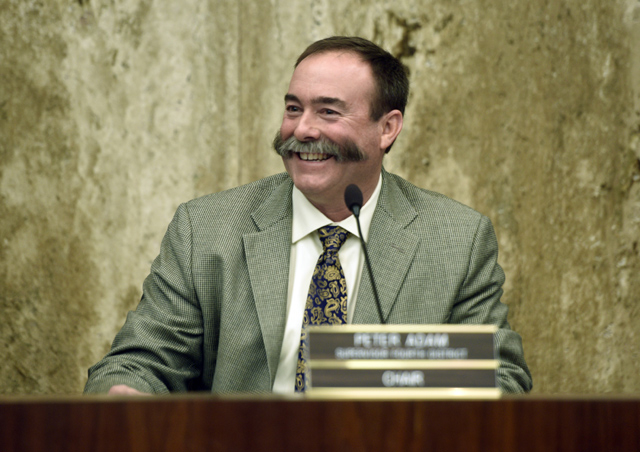
Chairpersonship
Supervisor Wolf, who was last year’s board chair, said not many perks come with the job. “We are all equal,” she said. The chair just “runs the meeting.” But Wolf did say as chair she was able to call more special meetings and budget workshops. The chair also signs official documents and resolutions that reflect the opinion of the majority board, which could be difficult for Adam. The reality is the chair speaks last and does not usually frame the deliberation. “We have to show stability,” Wolf said. Being involved also exposes you to people in need so you can help them, she added. “I think Peter has realized that,” she said.
Even though Adam considers his politics just short of being a true “Libertarian with a capital L”—because he does not agree with that political party’s position on legalizing drugs and militarization — he is also at odds with some conservatives. Armendariz noted it is difficult for any supervisor to accomplish much in the minority. “Sometimes Peter was in the minority of a minority,” he said. “I am very sympathetic to the [libertarian] philosophy, but sometimes there are things that government should get involved in that are beneficial.”
Governor Adam?
Over lunch, a half dozen men stopped by our table to congratulate Adam on becoming chair. So far, no one has formally challenged him for reelection, but Janet Blevins, a Lompoc Democrat active in environmental causes, might jump in the race. Blevins, who has criticized Adam during public comment, contended Adam thinks “pavement is more important than people.”
Adam found it difficult to articulate his transformation into politics. He said he was “born roughly where I am now” on the political spectrum.“If you live in the rearview, you’re going to crash into something,” he said. “If you would have told me six years ago that I would be the Chair of the Board of Supervisors, I would have laughed you out of the car,” Adam said. “There is this really credible group of representatives from a very credible group of people that told me recently I should run for governor. They got laughed out of the car.” I asked him, “Well, maybe in six years?” He responded, “No, no, no. I have attained the highest office I will seek.” As to how long he plans to stay in that office, he said there’s “no telling.”



